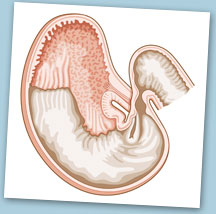
Gastric ulcers
Could your horse have gastric ulcers? A hidden yet common health threat, there are clues that can help you to recognise the condition, and ways to manage it.
Has your horse become grumpy recently? Developed a habit of snapping when you do up his girth? Is he struggling to put on weight? If so, he might be suffering from equine gastric ulcers – a prolific, ‘silent’ but painful and potentially life-threatening condition that can affect all types of horse and pony. There are different types of gastric ulcers, but essentially they are the result of erosion of the stomach lining due to extended exposure to the digestive acids which the horse’s stomach secretes. Studies show that 90 per cent of racehorses, 63 per cent of performance horses and 37 per cent of leisure horses suffer from them. Ulcers are also prevalent in foals – as many as 50 per cent will suffer at some point.
Signs and symptoms
Few horses show clearly defined outward signs of gastric ulcers, but there are subtle signs that can help identify the condition and many ways to manage it. ‘Horses can be at risk of gastric ulcers if they have a low forage and/or high concentrate diet, increased exercise intensity, or if they have been starved intermittently,’ says vet Victoria Copas from Liphook Equine Hospital in Hampshire. ‘If they have undergone changes in management and stabling, moved home or been stabled for a prolonged period, they may also be at risk,’ she adds.
The signs to look out for include: poor appetite, weight loss (or difficulty maintaining weight), poor performance, poor condition (including a dull coat), behavioural changes (such as grumpiness, particularly when girthing), and mild or recurrent colic. If you are at all worried, get your horse checked out – in extreme cases, gastric ulcers can develop to the point that the stomach perforates, which will be fatal. A definitive diagnosis can only be made by a vet using a video or fibre-optic endoscope to observe your horse’s stomach lining.
Treatment and prevention
Gastric ulcers can be treated, and prevented, by making changes to the way you manage your horse and his diet, and with medication. Clare MacLeod, registered independent equine nutritionist and author of The Truth About Feeding Your Horse, says: ‘Ulcer-prone horses should never be without food for more than a couple of hours. If he or she is prone to being overweight, source low-calorie forage. You can minimise the stress of ulcer-prone horses or ponies with company, limited confinement and either a strict routine or no routine at all (for example, a horse turned out 24/7 in a herd situation), and with careful training and riding.’
The most common treatment for gastric ulcers is some form of antacid medication, which reduces acidity in the stomach and allows the ulcers to heal. Antibiotics and gastroprotectants are sometimes used, too. If you suspect that your horse has gastric ulcers, Victoria Copas says that slowly introducing a change of diet that increases forage and grazing and eliminates high concentrates might be helpful. ‘The best plan would be to chat to your vet,’ she advises. ‘Discuss your horse’s current management and feeding and the signs that made you suspect ulcers. Whether or not the horse responds to a supplement isn’t strong enough evidence to confirm or rule out gastric ulceration.’
Clare Macleod’s feeding tips for horses with or prone to ulcers
- When attempting to treat your horse for ulcers, remember that the foundation of a balanced diet should not change – for example, do not feed 1kg of alfalfa and 250ml of corn oil to an overweight pony.
- Always offer forage ad lib – never leave your horse with nothing to eat, even while travelling. If your horse doesn’t have much of an appetite for the forage on offer, consider trying small, frequent meals of other high-fibre feeds such as nuts, unmolassed sugar beet or grass nuts.
- Avoid starchy and sugary feeds – for example, straight grain, coarse mix, molassed compounds and molassed chaffs.
- Alfalfa is thought to buffer stomach acid, so try feeding at least 1kg daily to an average 500kg horse, and offer 300-500g alfalfa to hard-working horses before fast work.
- Turn out horses to grass for as long as possible.
- Supplements containing antacids, pectin, lecithin, herbs and seaweed may help. Do not use salt (electrolyte) pastes regularly. Instead, train the horse to drink an oral rehydration solution and give salt in the feed.
- Do not use salt (electrolyte) pastes regularly. Instead, train the horse to drink an oral rehydration solution and give salt in the feed.


